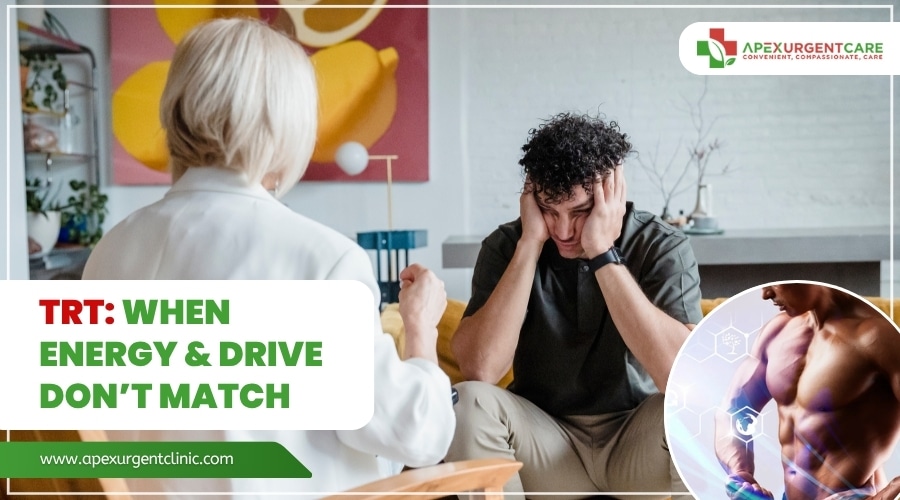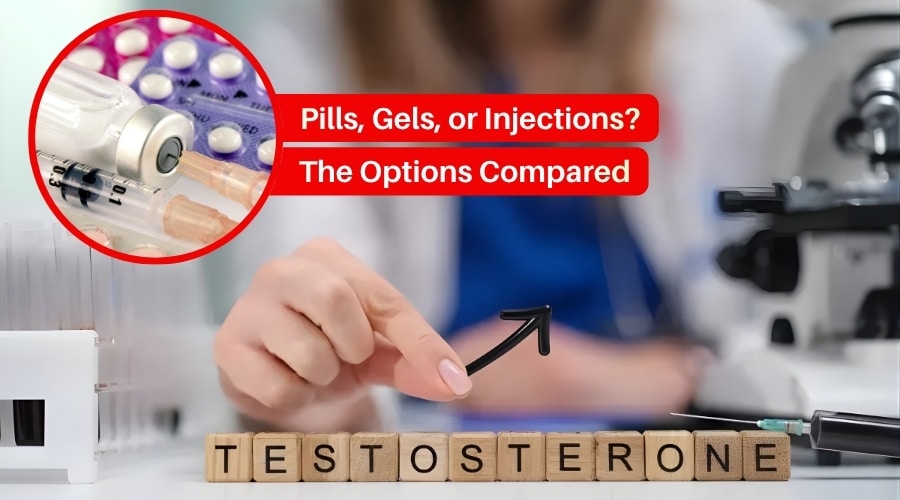
You used to wake up full of energy, have a productive day, enjoy your evening, and still have energy left at night. Now, you find yourself postponing things, losing interest, or not feeling like your old self. That missing spark, often called low libido, is more common than you might think, and there are ways to address it. At Apex MD Primary Care & Wellness Center, we talk with men and women about healthy hormonal balance and when it may be time for a different approach.
Let’s Look at the Disconnect Between Energy And Drive:
Low libido stems from many factors. For men, one possibility is low testosterone, the hormone that influences mood, energy, body composition, and sexual desire. Studies show that TRT improves libido in men with low testosterone. For women, hormonal shifts, especially around menopause or after childbirth, can also play a role. The key is recognizing when the drop in desire isn’t due to fatigue or stress, but something your body is signaling.
Pills, Gels, or Injections? The Options Compared

You may have seen countless “boost your drive” pills online or heard about supplements that promise magic. The truth is more nuanced:
- Pills or supplements seem convenient, but lack evidence of effectiveness and may not address the root issue of hormonal imbalance. Many articles warn about unregulated claims and unclear dosages.
- Testosterone Replacement Therapy (TRT), by contrast, is designed to bring hormone levels back into a healthy range through medically supervised methods.
The advantage: when low libido stems from low testosterone, TRT is purpose-made to restore that balance rather than mask symptoms. On the other side, it’s not a quick fix for everything, and it must be monitored by a healthcare provider—a Houston doctor at our clinic, for instance, can help you determine if TRT is the right path.
The Benefits Beyond Drive
When you address a hormonal imbalance, you see more than improved libido. Under proper care, benefits include:
- Greater energy and improved mood (less fog, more focus)
- Improved muscle mass and fewer unwanted fat gains
- A consistent well-being rather than the up-and-down.
While these are possible, keep expectations realistic. TRT isn’t a guarantee of your twenties again; it’s about helping your body work the way it’s meant to. Our Houston doctor can walk you through what to expect and the timeline for seeing results.
Is TRT Right for “You”?
Here’s how we frame it with patients at Apex MD Primary Care & Wellness Center:
- Step 1: Confirm there’s an underlying issue. You will have blood tests to check testosterone (and other hormones) and a clinical review.
- Step 2: Talk options. If low testosterone is confirmed, we will consider TRT—alongside supportive strategies like improved sleep, nutrition, and stress management.
- Step 3: Monitor and adjust. TRT isn’t one-size-fits-all. Your provider follows up to fine-tune your therapy and ensure safety.
What You Can Do Now
Here are a few steps you can take:
- Sleep consistently (poor sleep can reduce testosterone production).
- Strength train and move your body (exercise supports hormonal health).
- Eat adequate protein, healthy fats, and micronutrients to support hormones.
Take charge of your health today. Schedule your consultation at Apex MD Primary Care & Wellness Center so our doctor can review your history and goals with you. Start your journey to better well-being.

